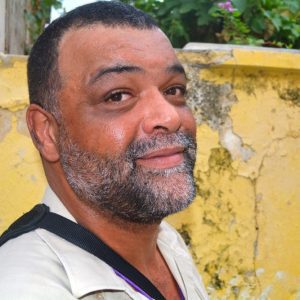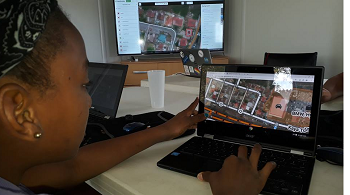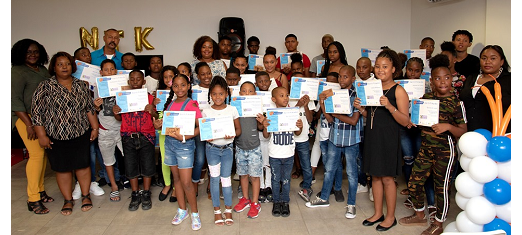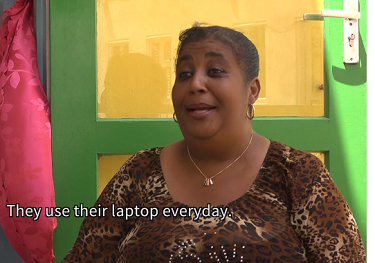Influencer Ace Suares
Interview September 2019

Ace, could you share with us some information of your family life?
I was born in Curaçao and grew up in Holland. I came back to Curaçao in 2002. I have a significant other and I have 3 children.
Could you share with us some of your educational background and past professional experiences as we know that you are an entrepreneur?
I am not an entrepreneur, I never wanted to become one. But I was forced to make a choice after I noticed, that I was unable to work under a boss. The job I had was exactly the type of job that I wanted to have, but I was smarter than my boss and that didn’t work out, so I quit. In life one is at times forced to make choices. I was aware of the consequences, as I went on welfare in Holland. It had lots of benefits, as I was free to do what I wanted to do. I learned so much in those days. I lived in communes, one time with 100 people in a building that looked like a castle. Basically, I had two choices, either to look for another job or start my own business. In Holland you could open an account and borrow NL 500,- and I started my business. I was traveling all over Holland as a system administrator for non-profit organizations, that was a big thing those days. Later on, in 1995 the internet started and the use of email and websites was not widespread. I installed email, made websites, and gave lots of workshops about the Internet. Then I started to host these services myself, so non-profits could have access to this new world without going to the helpdesk of large companies, which was very frustrating. Of course, all hosting was on a Linux environment and not in a Windows environment, so I became ‘the open source guy’.
What were the challenges you experienced while working for NGO’s?
Small NGO’s run by volunteers have certain disadvantages, as you want to deliver a good IT environment for them, comparable to what a large IT-firm would offer. They have bad computers, bad software and with all my good intentions to make the world a better place to live in, there is another side of the coin: those NGO’s don’t really appreciate the work you are offering. They are not as disciplined in keeping promises like being on time etc… At the other hand a company or government institution, that is willing to pay 200 USD per hour, will treat you more professionally and more politely, they will offer you a cup of coffee when you meet them for the first time and that is something that I learned: the more volunteers work in an organization, the lower they value work that others do.

We have met before when I was still working in government as we were trying to enable the one child one computer project through the Ministry of Education 5 years ago. Now I have heard from you that you channelled your focus via projects through the foundation Kòrsou Habrí like you are doing a project or have done a project for example in Ser’i Domi? Are you also involved in other projects in Curaçao ?
The One Laptop Per Child (OLPC) project dates from some time ago.
I was trying to convince people to see this project as an educational project to get access to what is going on in the world and not to see it as a computer project. By getting access to the internet and having a computer the students could develop themselves with the help of their teachers and parents of course. This idea was from proferssor Nicolas Negroponte of MIT. That was his vision. When I started with this Mr. Maurice Adriaens was Minister of Telecommunications and he liked the idea, and in the media also this was supported as everybody agreed with the concept that this could elevate the development level of our students. When Ivar Asjes was the Prime Minister he also tried to get this project going and it didn’t work. I stopped my efforts last year and surrendered to the idea that I will never have a role in the government, doing such a project, although I still deeply believe in this project.
What I am doing now is that in the neighborhood where I live here in the heart of Otrobanda, I have created Wi-Fi connection for about 10 children living very close to my house. Btw, what I have noticed is, that there is a false narrative saying the following: “Every kid has a smartphone or tablet with access to the internet.” Well that narrative is totally false. On average only 60 % of our population have access, but in Ser’i Domi that percentage is almost zero and in Jan Thiel it’s 90% or something and that means that on average 60 % do have access according to the CBS, but it’s not evenly distributed in the neighborhoods. So, when I found out that this was so, I decided to start a project for these 10 kids and got some funding and donations and bought some laptops and the children were allowed to go home with their laptop.
It was also part of teaching them to become more disciplined and teaching them responsibility. We don’t teach them Word or Excel, but we teach them how to search for information as part of preparing a presentation. We teach them Floorplanner and within half an hour they virtually create their houses, with 2 cars in front of the house, a LCD TV screen, and a swimming pool. Or they would use Google Streetview to go to Rotterdam and one would say: “Over there my aunt lives, this is her house!”. Or we would go to Dubai, Paris, New York and Cairo, experiencing the world through the eyes of these children, making their world bigger. Find out more about the project on Nos ta konektá Website or on Facebook.
Could you share with us some more information of the project you are doing in Ser’i Domi?
Well we already had run 3 projects. The first in Rif, Otrobanda (10 kids), the second in three neighborhoods (30 kids) and now in Ser’i Domi (45 kids). The first and second projects where focused on the age group 11 -17 years old, the latest project takes kids from 6 year and above. We run a project every two years and we have been doing this for 6 years now. In the second project, we noticed that the dropout rate was 50% for one specific neighborhood, which was caused by the lack of a supporting home.
In Souax the results were interesting, we had children from ZMLK till VWO and all other levels of education in between those, and they all progressed with big leaps forward. We aim at breaking their routine when they come from school which consists of going to bed to sleep for a while, they don’t read books and watch lots of TV. By breaking the routine, we have seen children from ZMLK whom couldn’t do anything and didn’t dare to do anything, grow so much. One of these students is now writing heartfelt poems, some others are baking chocolate cake which they learned via YouTube. They only need to search and watch a video where they bake a cake, there is no need for a cookery book.
You can imagine the increase in the level of self-confidence of this youth, after they have made their own cake. This as part of an assignment we give to the students. They need to select a subject matter from the internet, that they should make it themselves. This is empowering them a lot.
Whom are their teachers?
We hire experienced teachers with a degree for the primary educational level (Teacher Funderend Onderwijs) and pay them. It is better to pay then to use volunteers, because this entails more commitment and responsibility. Like someone where the husband is employed and the wife is willing to work as a volunteer, this is also better then someone that will come for 2 months as a volunteer and then after getting a job somewhere else, doesn’t show up anymore because they need the money to make a living, to survive. In Ser’i Domi we worked with a mother that lived in the neighborhood and knew all the children personally and their personal situation and if there were challenges are not. She could call and pick them up to attend the project. So over the years we have learned from all these projects, so we felt the need to add some kind of social work to the project so that at an early stage remedial actions could be taken. Some support for the parents, to give their children what they need to participate in the project.
What we have learned after doing these three projects was, that the environment of the children is very important. So we approached the Ministry of SOAW to become a partner and also support the parents of the participants in the project. Well, this didn’t work out completely, but we firmly believe that we should also involved the parents, as we are seeing children coming at the project that are totally without any energy and being apathetic and this affects their pro-activeness, their creativity and thus their development. In the past 3 years we have had over 100 children attending our projects and we have obtained a lot of donations, sponsoring and grants (about half of it coming from Dutch funds, and about 40% from local entrepreneurs and businesses), which we are grateful for, but we believe the government should also pinch-in as a partner in helping to give support to the parents.
On the OLPC project, just one more thing. Every person, from a cabdriver up to the highest ranks in government including Ministers, have this belief that poor children will break or steal the computer, once you let them take the laptop home. This is real shocking because apparently, we don’t trust our own children, when you give them something of value for themselves. This is unbelievable. All our projects showed 10 % in damage to the computers. We have a strategy, that we use to increase their responsibility. We don’t give the laptop right away. First they need to design a cup and bring it back to the lesson. Next, we are giving them a raw egg, that they need to bring back. So there’s a whole process of guarding the thing you got from us, and if you show you can guard these (fragile) things, we know that you are responsible and that your home environment is safe. Them we would give them an assignment to design and make a sticker. We print it and put it on their laptop so no one can make a mistake: this is Roshendricks laptop, that is Romenas laptop, it’s not an impersonal thing anymore. It’s really theirs. Now they have something of great value that is for themselves, and they treat it with great love and care. Remember some of these children come from very dysfunctional families, like the family where the parents went on a cruise for two weeks while leaving the children at home all by themselves. I never used to go in these neighborhoods except when I had some business to attend there, and I think most people that decide things on this island, are totally unaware that these things happen.
You are very involved with the youth, why is that?
I am not involved with the youth directly, I manage the projects and other professionals deal with the youth. I firmly believe that you just have to start at a very young age at the Kindergarten level already and start from scratch or when they are age 6 to 7 years old (in group 3) so that when they go to the secundary school level, they already know the basics. But you know what happens now at the VSBO (secundary school level) the students are forced to buy a computer. But if you see how the logistical infrastructure, that is a pre-requisite for internet access, is disfunctioning, it means that in fact the students don’t learn so much and that breaks my heart. For example, in a school at Koraal Specht, the class room where they were supposed to learn about computer science and what have you more, this class room was closed for 4 years. So if you live in an under-privileged background, you would be lagging far behind students where the school and/ or parents have taken care of adequate logistics and infrastructure as these students learn at home and at school.
What are the goals of the foundation Korsou Habri exactly?
The goal is to promote open source and the open data school of thought in Curaçao. That is why I use Chrome book instead of Windows for example.
What is your BIG WHY or driving motivation to be whom you are right now?
First of all my own curiosity and drive to know more. Furthermore, I despise the fact, that as a colored person growing up in Holland, I was considered to be less intelligent. When I made my CITO-test (this is a test you make before going to the secondary school level after finishing the primary school level), I scored 120 points higher than the next student at my school. Being “dumb” is totally unnecessary, as I believe our schools and educational system are not focused and aligned enough towards more progress. I work in less privileged neighborhoods, and the children from these neighborhoods are 80 to 100 % underdeveloped. We are a nation with people with so much talents when this developed, but we are vastly underutilizing these talents and they stay underdeveloped from their birth till grave. This needs to change, it has to. Because you know, 20 years from now the world would have totally changed even more so, we will need to have citizens, that can flourish in a knowledge economy era, that are outspoken and self-confident, that have the interpersonal skills that make it possible to collaborate in a mature matter with one another, that speak the required languages, so that we can jointly progress.
You can now see how the internet can be helpful in the development of languages. For example at the Prins Bernardschool as part of learning Dutch, students and teachers watch the “Jeugd Journaal” which is totally in Dutch, together and this helps them master the Dutch language. Imagine the teacher asking students at schools from less privileged backgrounds, getting an assignment to watch the “Jeugd Journaal”, because they would have to prepare a presentation in Prezi for example. As everyone under ideal circumstances would have internet access, this could be tremendously helpful in the development of students. This drives me, this is my WHY. Our society needs to go through a big transformation and we can use the internet and computers to create a level playing field also for those students from underprivileged neighborhoods. What a difference that would make!
What are the challenges that you are dealing with? And how are you dealing with these different challenges you confront?
My biggest challenge is in dealing with people. I love dealing with computers, computers are predictable, human beings just do things slightly different from what they have promised you to do and that is very challenging for me. On the other hand, I do love working collaboratively with people. Where everyone in the group have their own role to play. Explaining to people what the project is all about. I work in different projects and we have been relatively successful in collecting funds locally. We don’t have an AMBI status yet (This status is authorized by the Tax Department in Holland, allowing tax deductions for companies based in Holland giving donations as part of their corporate citizenship to organizations in for example Curaçao).
But it is not always easy, as having your own ideas on how things should be changed, remains a big challenge. I am really flabbergasted by some people working in government, that I would call insane, in need of psychiatric help that occupy very important positions in government and they should be dismissed form these positions. They would take decisions that would be detrimental for thousands of children and they get away with it. Really, really I am surprised that this is possible.
Do you use your inner voice to evaluate when dilemma’s show up? How does that work for you?
I would never describe this as you are doing it now. It is a process, continuously happening during the course of the whole day. If I have a challenge, I would entertain myself with a computer game for 2,5 hours and within 10 minutes solve something that I was struggling with for 3 weeks. I can also feel it in my gut when something is totally wrong. I was once on my way to a client where the approval or disapproval for a big assignment was planned to be discussed and on my way, I felt it, I knew that it was cancelled. So it is nice to have these abilities, but I would describe it in different wordings.
How are you trying also to keep up with your personal knowledge and skills levels?
I do lots of reading via Internet.
What are your strengths?
My ability to think logically, and attention for detail.
Do you have hobbies or interests that you are also passionate about?
Listening to music, playing a little bit with a guitar and some reading.
If you as Ace would meet a stranger in the bus (let say in Holland or the US) and they would ask you to introduce yourself, what would you answer?
I do something with computers.
How would you describe “Ace” in one word or one sentence?
“Ace” in English means ‘number One’, or ‘the best at something’. Reversely “Ace” in Spanish together with my last name “Suares”, means something that you don’t need, an extra that is nice to have but not necessary. In this life, this duality in my name is a way I look at life.
Whom are the persons that have inspired you the most in your career?
Musicians like Captain Beefheart; John Lee Hooker; Nick Cave those artists inspire. In the computer world, I don’t really have people that inspire me.
Where they always positive role models or where their also negative role models that you didn’t want to identify with?
Sexual abuse, being disrespectful towards women, gays, people of another skin color or handicapped people, that is what I condemn. These issues I had to deal with early on in my life, later on I became more aware and conscious of this and I don’t want to be part of these beliefs and mindsets. That is what I would say is: Negative role modelling.
What was a defining moment in your life?
When I was 15 years old at the secondary school and I first got acquainted with computers sciences in those days. The classes didn’t had computers, we only had the teachers, our pens and paper. I was immediately sold. I knew that this would be my career for the rest of my life.
Where do you want to be 15 years from now with your career?
If I would live on another planet that would be wonderful, but I don’t wander so far in the future.
What would you want your Loved Ones, family, friends and others to say about you let’s say 20 years from now?
I don’t wander so far in the future.
What makes you stay optimistic about the future of Curaçao?
The talent and the resilience of our people is there, I am experiencing this. I believe we have what is needed to get out of our flunk. But I have also experienced, that in the past 17 years how our educational system has further declined in terms of knowledge, personal development and courage. Our language issue is still looming and it is being neglected and not addressed properly. If we can solve these issues then I am convinced that our people will develop themselves and blossom, in that scenario there are so many good things possible that could happen.
Is there anything else that you would like to add?
Yes, we do have another project on STEM-education with coding and LEGO. This is another initiative we are trying to help parts of our youth to develop them self. Look at this video that we made of this project.
Website of STEM education, with videos: www.luna-di-stima.com
One of the 250 Influencers of Curaçao
Ace Suares is a (social) entrepreneur, an altruist and a representative of the NGO-sector. As a computer science expert for years, he has and still is exploring and implementing ways and means to further enable the development, especially of the less privilege youth in Curaçao . He recognizes and is experiencing the talent and the resilience of our youth in projects he is involved in and firmly believes, that we have what is needed, to anticipate the big transformational changes that are taken place in the world because of multiple technological developments taken place at the same time. He believes, that via free easy access to internet, we can accelerate the educational backlog in knowledge, personal development and the pro activeness of our youth and subsequently blossom as a country. We deeply respect and love Ace for the work he has been doing, for his advocacy of free and easily accessible internet on the island, to be better able to anticipate the transformational changes that currently are taking place in the world. We definitely consider him one of the 250 Influencers in our society.







